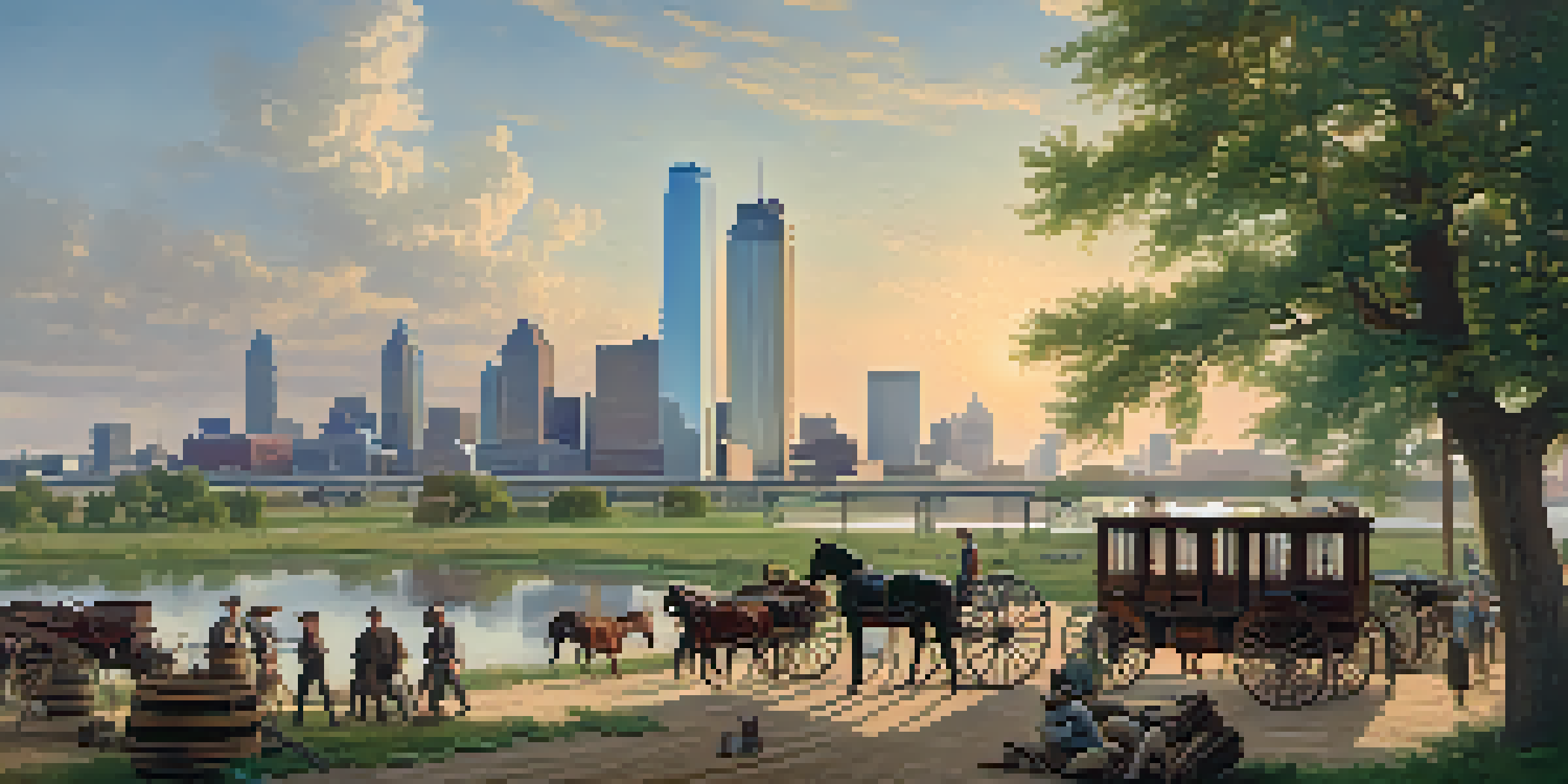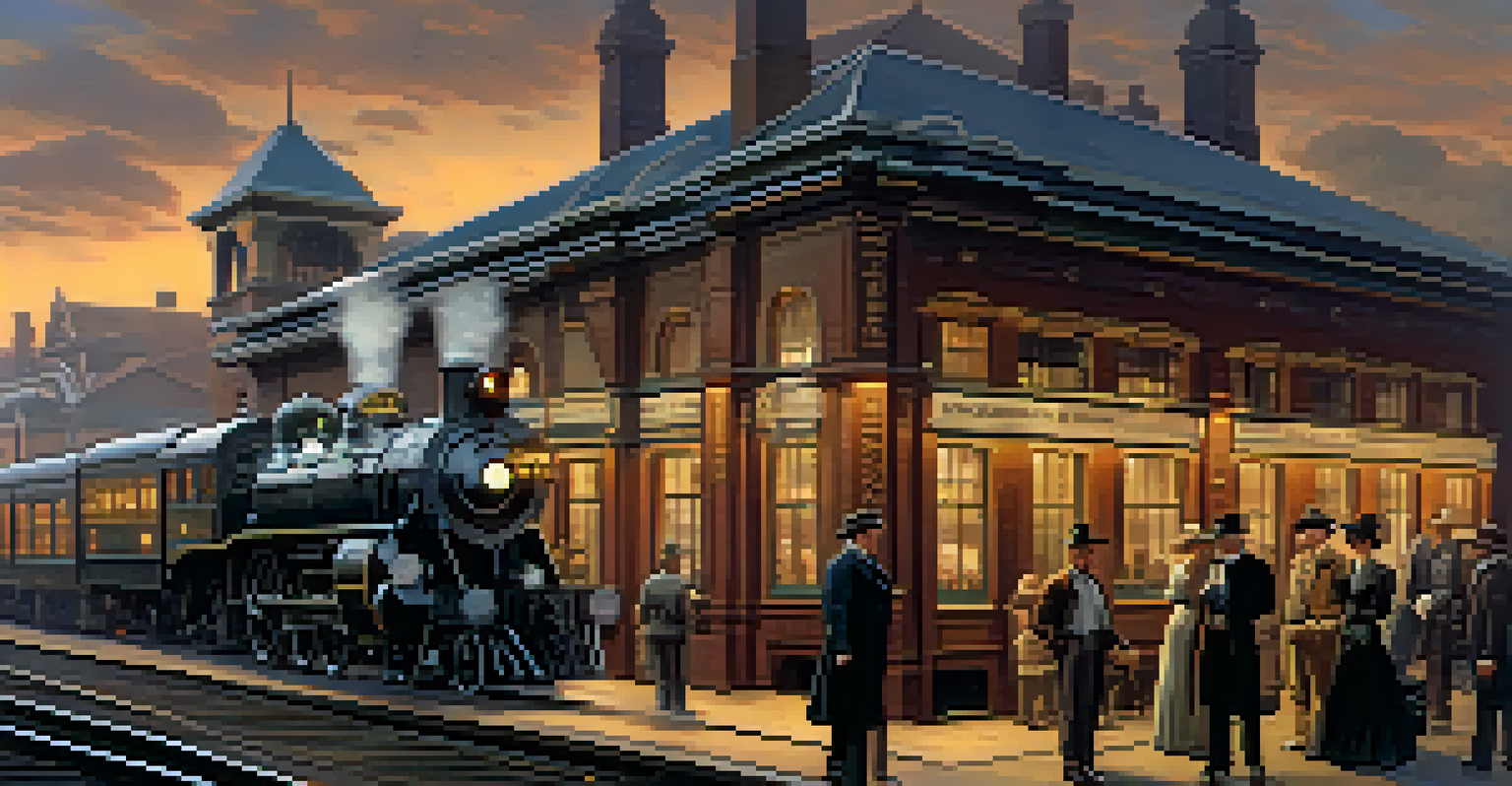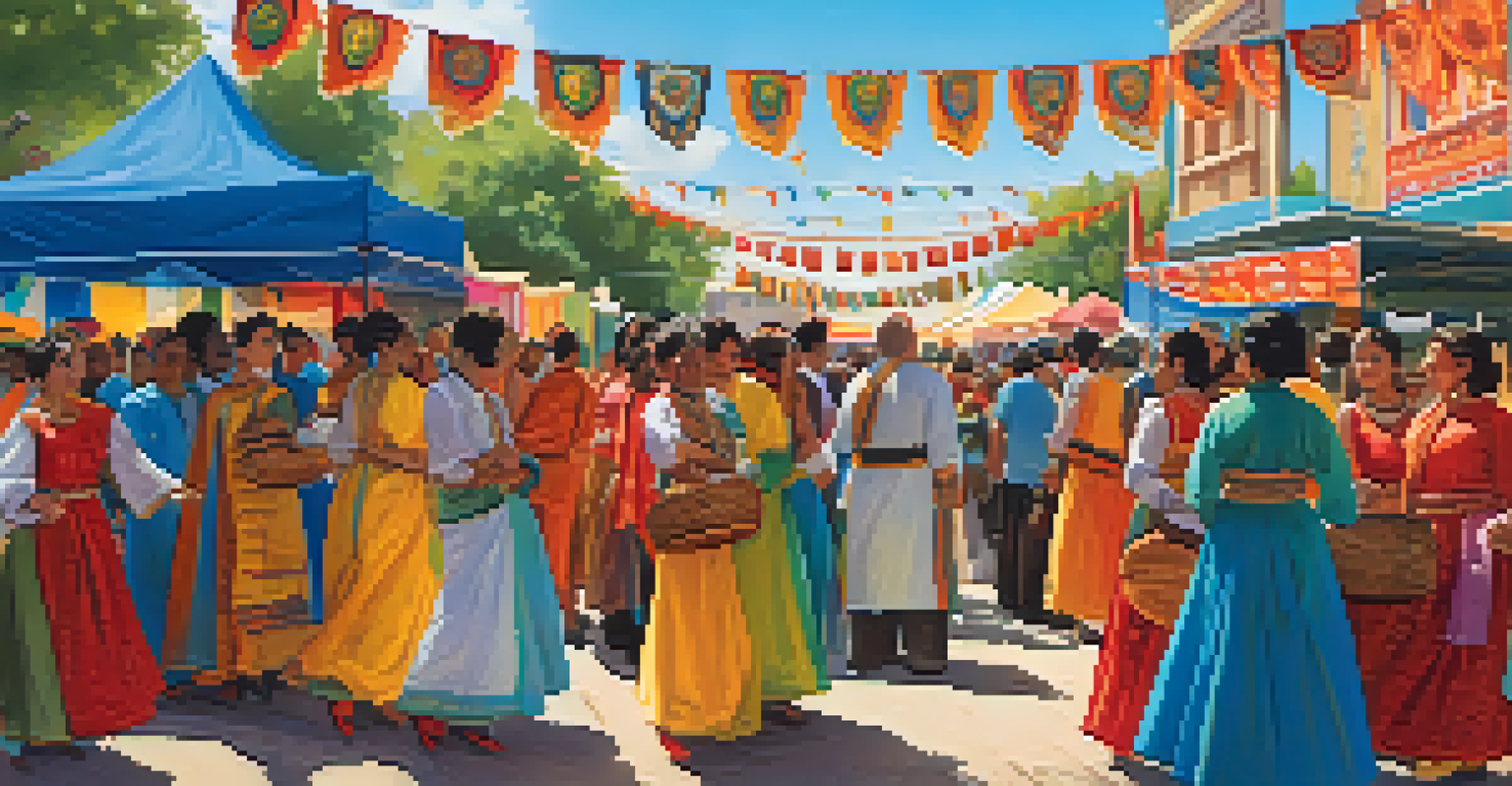Dallas's Role in the Expansion of the American West

Dallas: A Strategic Hub for Westward Expansion
Dallas emerged in the mid-1800s as a critical junction for trade and transportation. Its location along the Trinity River made it an ideal spot for early settlers looking to expand westward. The convergence of several key roads and railways in the area facilitated the movement of goods and people, effectively positioning Dallas as a gateway to the West.
The American frontier is a place of fleeting encounters and lasting legacies.
This accessibility attracted pioneers, entrepreneurs, and settlers, all eager to make their mark on the expanding frontier. As a bustling trade center, Dallas not only supported local economies but also served as a launching point for further exploration into Texas and beyond. The city quickly became synonymous with opportunity and adventure, embodying the spirit of the American frontier.
Moreover, the influx of diverse populations contributed to Dallas's cultural richness, creating a melting pot of ideas and innovations. This dynamic environment fostered a sense of community and collaboration, which was essential for the collective efforts of those seeking to carve out a new life in the West.
The Role of Railroads in Dallas's Growth
The arrival of the railroad in the late 19th century marked a pivotal turn in Dallas's history. Railroads connected the city to major markets and resources, transforming it into an essential link in the national transportation network. This development not only accelerated the movement of goods but also attracted a wave of new settlers eager for economic opportunities.

As rail lines expanded, so did Dallas’s influence on the surrounding regions. The city's railroads facilitated the transport of agricultural products, livestock, and manufactured goods, enhancing local industries and boosting the regional economy. This economic growth made Dallas a prime destination for those looking to establish businesses, further fueling westward expansion.
Dallas: A Trade and Cultural Hub
Dallas emerged as a vital junction for trade and cultural exchanges, fostering economic growth and a rich tapestry of diverse communities.
Additionally, the railroad era brought about significant advancements in infrastructure. Improved roads, telegraph lines, and later, highways followed the railways, allowing for even greater connectivity and accessibility. This infrastructure laid the groundwork for Dallas to evolve into the thriving metropolis it is today.
Cultural Exchanges in Early Dallas
Dallas was not just a geographical hub; it was also a cultural crossroads where diverse communities converged. As people from different backgrounds settled in the area, they brought their traditions, languages, and customs, enriching the local culture. This blending of influences helped shape a unique identity for Dallas, reflective of the broader American experience of the time.
Cities are the greatest creations of humanity, and their history is the record of our progress and our missteps.
The cultural exchanges that took place in early Dallas fostered a spirit of innovation and creativity. Art, music, and culinary practices flourished as different groups shared their heritage. Events and festivals celebrating these diverse cultures became common, promoting unity and understanding among the residents.
Furthermore, this cultural vibrancy attracted more settlers and visitors, further solidifying Dallas's reputation as a dynamic and welcoming place. The city’s ability to embrace diversity became a cornerstone of its identity, echoing the ideals of the American West as a land of opportunity for all.
Economic Development Driven by Trade
Trade played a fundamental role in Dallas's growth and the broader expansion of the American West. As the city developed into a major trading hub, it became a focal point for commerce, connecting producers and consumers across vast distances. This trade network facilitated the exchange of goods, ideas, and resources, significantly impacting the region's economy.
Local businesses thrived in this environment, catering to the needs of settlers and travelers alike. From general stores to agricultural suppliers, these enterprises contributed to the economic foundation of Dallas, making it a vital player in the western expansion narrative. The city's strategic position enabled it to capitalize on the demand for supplies and services as more individuals moved westward.
Railroads Fueled Dallas's Growth
The arrival of railroads transformed Dallas into a crucial link in national transportation, attracting settlers and boosting local industries.
Moreover, the economic boom attracted investors and entrepreneurs, leading to further development and innovation. The resulting prosperity laid the groundwork for Dallas to evolve into a major urban center, illustrating how trade not only fueled local economies but also shaped the trajectory of the American West.
Dallas's Political Influence in the West
As Dallas grew, so did its political significance in the region. The city became a center for governance and decision-making, influencing policies that affected the broader western territories. Local leaders and politicians recognized the importance of supporting westward expansion and advocated for infrastructure improvements and land reforms.
Dallas's political clout was evidenced by its role in the establishment of Texas as a state and its subsequent influence on national policies. The city's leaders worked diligently to ensure that Dallas remained a key player in discussions around land rights, transportation, and economic development, shaping the future of the American West.
This political involvement not only bolstered Dallas's standing but also contributed to the sense of unity among western settlers. The collective efforts to promote and support westward expansion fostered a shared vision for the region, encouraging collaboration among communities seeking to thrive in the evolving landscape.
Impact of Dallas on Indigenous Communities
The expansion of Dallas and the American West had significant implications for Indigenous communities in the region. As settlers moved into the area, they often encroached upon the lands traditionally inhabited by Native American tribes. This displacement led to a dramatic shift in the cultural and social dynamics of the region.
While some settlers sought to coexist and trade with Indigenous peoples, many others viewed westward expansion as a zero-sum game. The competition for land and resources intensified, often resulting in conflicts and treaties that favored settlers. The consequences of these actions created lasting impacts on the Indigenous populations, altering their way of life and social structures.
Legacy of Indigenous Communities
The expansion of Dallas significantly impacted Indigenous communities, highlighting the need to acknowledge their resilience and contributions in the region's history.
Despite these challenges, Indigenous communities have shown remarkable resilience. Their histories and contributions to the region remain integral to the narrative of Dallas and the American West. Acknowledging this complex relationship is essential to understanding the full scope of Dallas's role in shaping the region's history.
The Legacy of Dallas in the American West
Today, Dallas stands as a testament to the transformative processes that shaped the American West. The city's rich history of trade, culture, and innovation has left an indelible mark on the region. As a thriving urban center, it continues to embody the pioneering spirit that characterized the westward expansion.
The legacy of Dallas is evident in its diverse population, vibrant economy, and cultural institutions. The contributions of those who settled in Dallas—whether they were traders, farmers, or artists—have collectively woven a rich tapestry that reflects the broader narrative of the American experience. This ongoing evolution underscores the dynamic nature of cities and their ability to adapt and thrive.

Moreover, understanding Dallas's historical role encourages us to reflect on the complexities of growth and expansion. As we celebrate the achievements of the past, it’s crucial to acknowledge the challenges faced by various communities throughout history, ensuring that the story of Dallas and the American West remains inclusive and multifaceted.